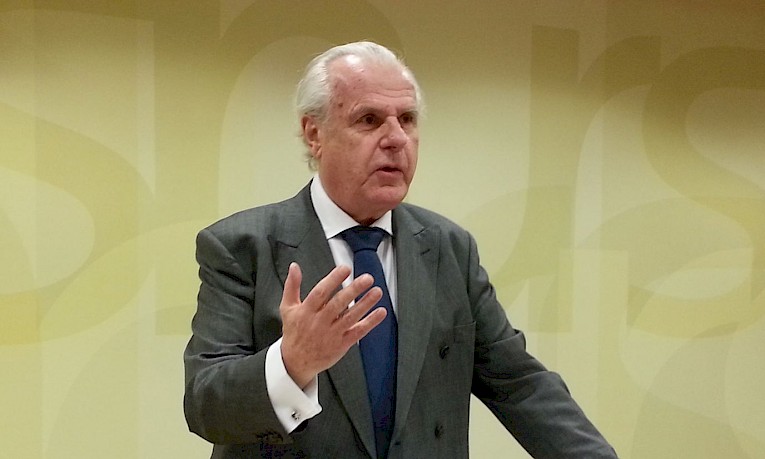The SBE had the pleasure of hearing from Lord Paul Myners in March on the topic of UK public company ownership. Drawing heavily on his experiences at Gartmore he concluded management and owners of public companies are on an unequal footing, and that there is also a vacuum of communication and cooperation between these two groups which has weakened decision making. Overall this has undermined corporate purpose, resulting in the long term performance of public companies becoming jeopardized.

He attributed the shortcomings of the current model of PLC ownership to an explosive increase in institutional investment from large funds in recent decades and poor portfolio construction, as well as improper performance measures used by fund managers.
Lord Myners stated that institutional investing and fund management is a relatively new profession, emerging around the 1970’s. This business line grew explosively (especially with the advent of defined benefit pension schemes), highlighted by the emergence of more analytical portfolio comparison measures such as Time Weighted Return (TWROR), compared to previously flawed measures of portfolio performance pre-1970. Fund management has now grown into one of the most profitable areas of finance.
However, portfolio diversification and construction were not well understood. In the 1980’s when the UK’s economy began to diversify, investment managers were able to reduce stock-specific risk through portfolio diversification. Performance indicators also became more advanced with the use of tracking-error and other tools for relative performance. This diversification process was driven partially by the need to deliver competitive returns to clients. However this was also driven by the need for fund managers to protect their business as Lord Myners states that the primary role of a fund manager is to gather assets in order to benefit from Ad Valorem fees.
The overall effect of the diversification of large funds was the fragmented ownership of our largest companies. Lord Myners questioned whether there was a point where ownership was large enough to change the business relationship of companies such as Gartmore to the companies it owns, warranting a greater duty of care and responsibility. In the case of many owners the answer is ‘no’, highlighting the separation between owners and managers of public companies that has persisted into the long term.
Lord Myners also highlighted several further issues which could undermine company performance that result from fund managers’ methodologies and the lack of close involvement with the management of firms they own.
The first is the adoption of relative performance benchmarks (such as TWROR and Tracking Error) as key performance indicators for fund managers, which can potentially damage incentives. In his experience, even when losses were made bonuses would still be paid on the basis that the losses were lower than in other investment companies. This removes the incentive for fund managers to seek a strong intrinsic performance from their investments as opposed to a strong relative performance.
The second is that from his experience, funds would need to invest in certain key companies (whatever their expectations were for the company) in order to satisfy and thus retain their client base. Similarly Myners believes there is a fundamental flaw in funds taking an underweight position in a company in these scenarios as managers should not have to invest in a company they expect to underperform.
Thirdly are the existing mechanisms for dealing with underperforming investments, which Lord Myners summarized as a choice between ‘Speak’ or ‘Sell’. Speaking out and trying to reform management would take a great deal of time and thus there is often little benefit to fund managers seeking this option when it is much easier to take the ‘Sell’ option and search for more favourable investments. This problem is also exacerbated in the UK where legislation allows for the easy take over a company and thus further encourages selling. This weakens the management of public companies and causes them to underperform for long periods of time without facing any pressure for reform. This has also had substantial consequences for the economy; Lord Myners attributes the decline of the food and shipping industries to the selling of shares by investment funds in times of cyclical underperformance.
Overall Lord Myners believes that the separation of management and ownership in public companies is a substantial and persistent problem. Fund managers exercise huge economic power and have overstressed the requirement for immediate short term returns rather than the long term growth of companies, in turn reducing the health of these companies. To tackle this problem he suggests: a transactions (Tobin) tax to reduce hyper-trading and discourage over-diversification; a fundamental review of legislation in the UK; greater action from trustees to control the benchmarks used by fund managers; and measures to encourage the cooperation of investors and company managers.
Written by Arjun Saini


